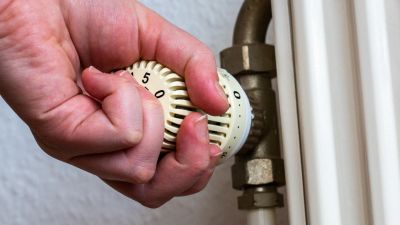Explainer
How warm should your house be? New research links cold indoor temperatures to poor health

Cold indoor temperatures are linked to poor health, according to new research.
Public Health Wales found that exposure to temperatures of 18°C or below at home were associated with negative effects on health - especially related to heart and lung health, sleep, physical performance and general health.
Hayley Janssen, Public Health Researcher at Public Health Wales, says the report suggests that as temperatures fall below 18 degrees, some health risks gradually increase.
“The overall evidence suggests that households will avoid many of the health risks associated with cold homes if they generally maintain home temperatures of 18°C or above, which is the minimum temperature to which the WHO and UK authorities, including Wales currently recommend the general population heat their homes", she said.
"As temperatures dip below 18°C some health risks gradually increase but these can vary with vulnerability and age."
She added: “Our research did also show that there are significant gaps in the evidence – such as the effects of colder temperatures on children and young people, the long-term health and well-being effects of exposure to low indoor temperatures and the impact of cold indoor temperatures on mental health and well-being.”
How cold is too cold?
Below 13° - If your home is this cold, it may increase your blood pressure and risk of cardiovascular disease.
14-15° - If your home is this cold, you may be diminishing your resistance to respiratory diseases.
18° - This is the recommended night time bedroom temperature. Welsh Government currently advises households to set temperatures to 18°C in rooms excluding the living room for 9 hours in every 24-hour period on weekdays, and 16 hours in a 24-hour period on weekends.
19-21° - This is the recommended daytime temperature range for occupied rooms. The Welsh Government currently advises households to set temperatures to 21°C in the living room for 9 hours in every 24-hour period on weekdays, and 16 hours in a 24-hour period on weekends.
24-27º - This is considered to be too warm and can put babies and young children at risk.
For households with vulnerable people, the recommendations are 23°C in the living room and 18°C in other rooms achieved for 16 hours in a 24-hour period.
However, given increasing fuel poverty, the cost of living and energy prices, many households may be unable to reach such targets. Therefore, the report recognises that further efforts are needed to understand the relationship between fuel poverty and exposure to cold indoor temperatures and health and well-being.
The report also found recommendations need to be considered in the context of other factors, including climate change and household occupants. For example, the Lullaby Trust recommends a room temperature of 16-20°C, to reduce the risk of infants overheating, which is a risk factor for sudden infant death syndrome (SIDS).
Cost effective ways to stay warm:
Layer your clothing - wear multiple layers, rather than one thick piece of clothing.
Block any draughts - Try and block any areas in your home that are particularly draughty, including around window frames, keyholes and under doors.
Think about heating - Try and keep the room where you spend most of your time, such as your living room or bedroom, the warmest.
Make warm food and drinks - Eating a healthy balanced diet can help your immune system to work well during winter. Have regular hot drinks and food to keep yourself warm. Using a a slow cooker, microwave, or air fryer can be more cost affective than using an oven.
Exercise - Keeping active boosts your circulation and will help keep you warm.